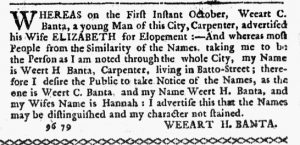What was advertised in a colonial American newspaper 250 years ago today?

“I advertise this that the Names may be distinguished and my character not stained.”
Weert H. Banta, a carpenter, took out an advertisement in the New-York Journal in hopes of resolving a case of mistaken identity and remedying any damage done to his reputation as a result of the confusion.
Banta reported that Weert C. Banta, also a carpenter, had published an advertisement concerning the “Elopement” of his wife, Elizabeth, two months earlier. In that fairly standard runaway wife notice, the other Banta proclaimed that Elizabeth departed “without any cause” and that he was “apprehensive [she] may run me [into] Debt.” To that end, he desired to “warn all Persons, that they do not Trust, harbour or entertain her, on my Account, for I will pay no Debt of her contracting.”
Due to the similarity of their names and their shared occupation, many readers of the New-York Journal and other residents of the city had mistaken Weert H. Banta for Weert C. Banta. The former Banta clarified that he had not placed the advertisement. Furthermore, his wife’s name was Hannah, not Elizabeth. Not only did he seek to sort out the confusion, he implored “that the Names may be distinguished and my character not stained.”
Banta may have also worried about his wife’s reputation, but as a carpenter “noted through the whole City” he expressed primary concern about his own character and what friends, neighbors, and business associates would think of him. Advertisements for runaway wives typically depicted the absent women as the transgressors in marital relationships, but they still did not reflect well on the men who placed such notices in the public prints. That a wife had “eloped” revealed that her husband failed to exercise proper authority or to maintain order in his own household. These advertisements may have been considered a necessary last resort as a means of reining in recalcitrant wives or at least saving husbands money they did not authorize runaway wives to spend, but they did so at the expense of their masculinity. Anxious not to lose face, Weert H. Banta needed his fellow colonists to know that Hannah, his wife, had not run away. Instead, he competently governed his own household.
